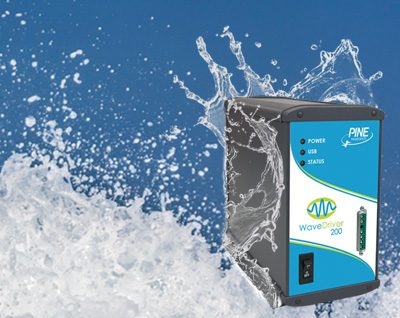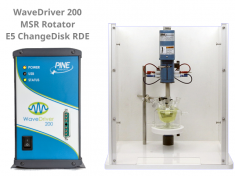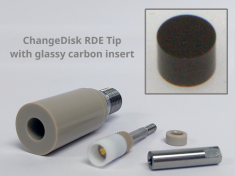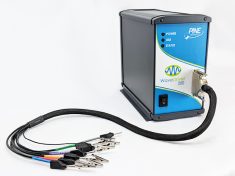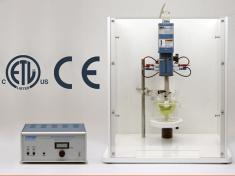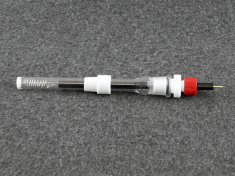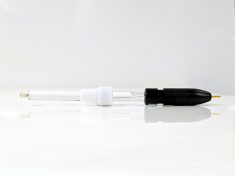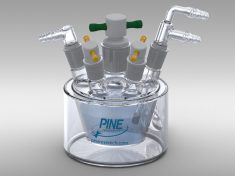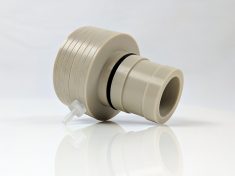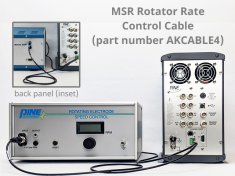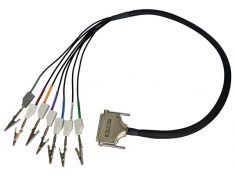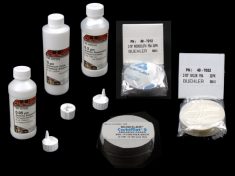| # | Description | Price in USD | |
|---|---|---|---|
| Bipotentiostat/Rotator Bundle | |||
| [WD200-MSR-RDE-E5TQ] |
MSR Rotator ChangeDisk Rotating Disk Electrode with WaveDriver 200 Bundle includes WaveDriver 200 bipotentiostat, MSR Rotator, software, cables, electrodes, cell, and accessories |
||
| Power Cords |
this bundle includes two power cords |
||
| List of All Items Included in Bundle | |||
| Software | |||
| AFP3 |
WaveDriver 200 EIS Bipotentiostat/Galvanostat |
||
| ACP3E01 |
WaveDriver Bipotentiostat Cell Cable |
||
| AFMSRCE |
Pine Research MSR Rotator the most popular electrode rotator in the world |
||
| AKCABLE4 |
Rotation Rate Control Cable |
||
| AFE5TQ050PK |
ChangeDisk RDE Tip maximum rotation rate is 2500 RPM - never exceed maximum rotation rate when working with rotating electrodes. |
||
| AFED050P040GC |
Glassy Carbon Disk Insert |
||
| AFE6K050 |
Disk Ejection and Polishing Tools tools for installing, removing, and polishing disk inserts |
||
| AFE6MB |
RDE/RRDE Shaft for MSR Rotators |
||
| AFCTR5 |
Standard Platinum Counter Electrode Kit |
||
| RREF0021 |
Single-Junction Silver Chloride (Ag/AgCl) Reference Electrode |
||
| AKCELL3 |
Jacketed Glass Cell for Rotating Electrodes |
||
| AC01TPA6M |
Gas-Purged Bearing Assembly |
||
| AKPOLISH |
Polishing Solutions and Materials Kit |
||
The best way to work with a Pine Research Rotating Disk Electrode (RDE) system is to pair it with a Pine Research electrochemical workstation. This bundle gets you started with a ChangeDisk RDE tip, an interchangeable glassy carbon disk insert, a WaveDriver® series bipotentiostat/galvanostat, and a Pine Research Modulated Speed Rotator (MSR) – the most popular electrode rotator in the world.
Under the control of our powerful AfterMath® software package, the WaveDriver 200 is capable of performing Electrochemical Impedance Spectroscopy (EIS) and a wide range of DC electroanalytical techniques including hydrodynamic voltammetry. This instrument is a truly integrated bipotentiostat with a convenient cell cable that allows quick and easy connection to a rotating disk electrode (RDE) or rotating ring-disk electrode (RRDE).
The versatile Pine Research MSR Rotator lets you get started immediately with RDE experiments. Later, when you are ready to expand your research to include dual working electrode techniques, simply thread an RRDE tip on to the rotator and connect the ring electrode to the second working electrode connection on the bipotentiostat. This RDE start-up bundle includes the following principal items along with compatible cables and accessories:
- WaveDriver 200 EIS Bipotentiostat/Galvanostat
- Pine Research MSR Rotator, ChangeDisk RDE tip, and glassy carbon disk insert
- Pine Research AfterMath Software
- Jacketed RDE Cell (glass) with Pt Counter and Ag/AgCl Reference Electrode
The WaveDriver 200 EIS Bipotentiostat/Galvanostat is the most complete electrochemical workstation offered by Pine Research. Unlike other “bipotentiostats” on the market, this instrument has a truly integrated bipotentiostat circuit by design. Because the second working electrode is fully-integrated into the design, the instrument is ready to use out of the box, the cell cable has convenient electrode leads for both the first and second working electrodes (no messy cable configurations necessary), and no additional adapters or connectors are required to perform true dual working electrode experiments like rotating ring-disk voltammetry. Further, the WaveDriver 200 finds use across a wide variety of applications with current ranges up to ±1 Amp, potential ranges up to ±15 V, advanced input, output, and waveform filters, iR compensation, and EIS up to 1 MHz.
Our talented team of engineers and chemists have taken a careful approach at integrating EIS into our WaveDriver series potentiostats. Our software engineering team has incorporated EIS equivalent circuit fitting directly into our AfterMath® software platform. Multiple curve fitting algorithms and options allow you to fit even the most troublesome data. This instrument is a cost-effective tool you can use to make a wide variety of electrochemical measurements in your research work. The unique features of the WaveDriver 200 are summarized below.
Cost-Competitive. Take a look around at similar bipotentiostat/galvanostat systems and you will have a difficult time finding another with comparable specifications and capabilities at the price of the WaveDriver 200. While you may find a single-channel EIS-capable potentiostat at a similar price, the WaveDriver 200 gives you a built-in second working electrode without having to purchase a second channel.
Integrated Curve Fitting and Analysis. Our software team has seamlessly integrated EIS curve fitting into AfterMath. Why work with more than one software application to fit your EIS data when you can do it using the very same software application that acquired the data? AfterMath EIS curve fitting utilities provide several analyses, including Circuit Fit, Transmission Line, and Kramers-Kronig. Unlike others, our fitting software also provides several fitting methods including Modified Levenberg-Marquardt (LM), Simplex, and Powell algorithms in addition to fitting options that include dynamic point selection, unity, and parametric fitting.
Novel Transmission Line Fitting. AfterMath provides a unique approach to model your porous electrodes. While the transmission line model is not new, AfterMath provides you with some unique transmission line fitting tools. Instead of a static circuit, where you have no control over the elements of the model, we provide a very flexible basic model, from which you can customize nearly all aspects of the model to suit your system. Give it a try – import your three- or five-column EIS data directly into AfterMath and see the difference with our transmission line fitting.
Finishing Touches. While fitting your EIS data, why flip back and forth between Nyquist and Bode plots? Why not be able to view both plots and fits simultaneously? We heard this feedback from many customers and have designed AfterMath to provide you with both plots simultaneously during fitting. You can also draw your own equivalent circuits to fit your particular system.
What makes the WaveDriver 200 bipotentiostat even more powerful?
Combining it with a precision electrode rotator manufactured by Pine Research…
MAXIMUM ROTATION RATE: Each electrode tip model used with the Pine Research MSR Rotator has a maximum rotation rate. Do not the exceed maximum rotation rate when working with rotating electrodes.
The Pine Research MSR Rotator is the most popular rotating electrode configuration worldwide. This flexible electrochemical instrument may be used with Rotating Disk Electrodes (RDE), Rotating Ring-Disk Electrodes (RRDE), and Rotating Cylinder Electrodes (RCE). The MSR Rotator bears both the CE and ETL marks and is compatible with most international power configuration standards.
The rotation rate of the electrode may be adjusted using a control knob on the front panel of the motor control unit, or alternately, the rotation rate can be controlled via an analog control signal provided by a potentiostat or by a third-party waveform generator. The rotation rate may be viewed using the LCD display on the front panel. The rotation rate is adjustable over a range from 50 to 10,000 RPM and is accurate to within 1% of the reading on the display. A rotation rate may also be monitored via an output signal proportional to the rotation rate which is available on the front panel.
The rotation rate may be controlled and modulated by a sine wave, square wave, or other externally generated waveform. The outstanding acceleration characteristics of the motor and its control circuitry allow the rotation rate to follow the control waveform with very little error. This feature is particularly desirable for techniques such as Hydrodynamic Modulation Voltammetry (HMV) .
The rotator motor position is easily raised or lowered with respect to the cell platform, making immersion or removal of the rotating electrode tip quick and easy. The enclosure base is made from chemically resistant polypropylene, and the large enclosure window provides a good view of rotating electrode during operation. (A smaller base is available separately for using the rotator in a glove box or fume hood.)
Electrode connections are made to the rotating shaft using silver-carbon brushes. There are two pairs of contacts – the red pair is for the disk, and the blue pair is for the ring.
Visit our YouTube channel for helpful instructional videos regarding the use and maintenance of this and many other Pine Research products.
All specifications are subject to change without notice.
| WaveDriver 200 EIS Bipotentiostat / Galvanostat | |
|
Working Electrode Channels |
2 |
|
Measured Current Ranges |
±1 A, ±100 mA, ±10 mA, ±1 mA, ±100 μA, ±10 μA, ±1 μA, ±100 nA |
|
Autoranging |
Yes |
|
Practical Current Range |
20 pA to 1.0 A |
|
ADC Input |
16 bits |
|
Compliance Voltage |
±17 V |
|
Measured Potential Ranges |
±15.0 V, ±10.0 V, ±2.5 V |
|
CV Sweep Rate (min) |
10 μV/s (469 μV step per 46.9 s, 313 μV step per 31.3 s, or 78 μV per 7.8 s) |
|
CV Sweep Rate (max) |
75 V/s |
|
Point Interval |
80 μs (minimum) |
|
EIS Capable |
Yes |
|
EIS Frequency Range |
10 μHz - 1 MHz |
|
Instrument Dimensions |
160 × 324 × 255 mm |
|
Instrument Weight |
4.6 kg (10.2 lb) |
|
Interface |
USB |
|
Wireless Capable |
No |
Additional Specifications |
|
| Modulated Speed Rotator (MSR) | |
|
Rate Accuracy |
100 to 200 RPM: Accurate to within ±2 counts of display reading |
|
Rate Control (external) |
Optional rate control via input signal on control unit front panel |
|
Rate Output |
Allows optional external monitoring of rotation rate (banana jack, control unit front panel) |
|
Maximum Continuous Torque |
28.3 mN m |
|
Motor Power |
15 W |
|
Electrode Connections |
Disk electrode: red banana jack on motor unit |
|
Dimensions |
Control unit: 11.4 × 10.1 × 5.75 in (29 × 26 × 15 cm) |
|
Shipping Information |
Shipping weight: 60 lb (27 kg) |
|
Rotating Disk (RDE) |
E2, E3, E4TQ, E5, E5TQ |
|
Rotating Ring-Disk (RRDE) |
E6, E7, E8 |
|
Rotating Cylinder (RCE) |
ACQC, E9 |
Additional Specifications |
|
| Single Junction Silver Chloride Reference Electrode | |
|
Standard Potential |
0.199 V vs. NHE |
|
Filling Solution |
4 M KCl with AgCl |
| Document # | Title |
|---|---|
| WaveDriver 200 EIS Bipotentiostat/Galvanostat | |
|
DRU10162 |
WaveDriver 200 User Guide |
|
DRB10224 |
WaveDriver 200 Brochure |
|
DRK10242 |
AfterMath EIS Data Import Procedure |
|
DRD10200 |
WaveDriver 200 Accuracy Contour Plot |
| Pine Research MSR Rotator | |
|
DRU10002 |
Pine Research MSR Rotator User Guide |
|
DRB10087 |
Pine Research MSR Electrode Rotator Marketing Brochure |
| Electrode Information | |
|
DRP10143 |
E5TQPK Series ChangeDisk Rotating Disk Electrode Information |
|
DRP10061 |
Care and Use of the Platinum Counter Electrode Kit |
|
DRP10025 |
Silver/Silver-Chloride Reference Electrode User Guide |
|
DRK10135 |
Electrode Shrouds Overview |
|
DRK10013 |
Pine Research Electrode Polishing Guide |
Contact us with any questions or support requests by phone or e-mail.
Below are selected product references:



